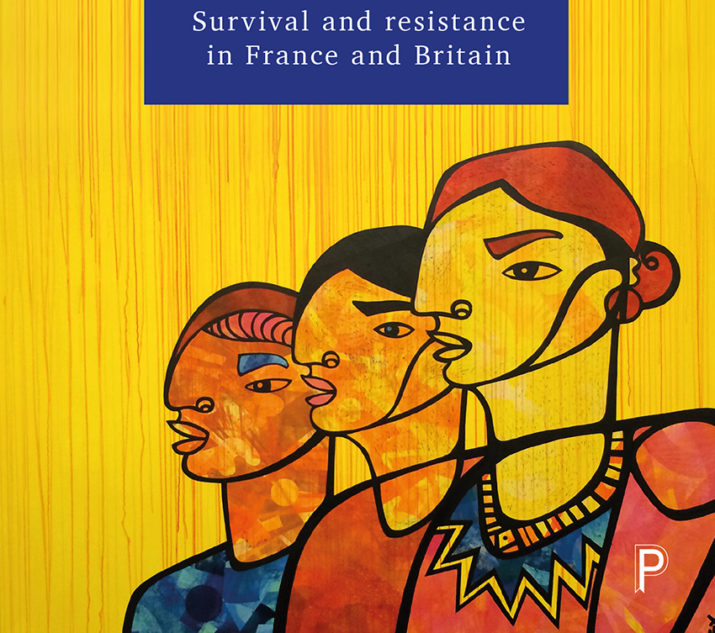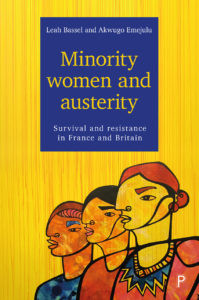
Minority Women and Austerity: Survival and Resistance in France and Britain by Leah Bassel and Akwugo Emejulu
This is part of our special feature on Anxiety Culture.

Bassel and Emejulu’s book Minority Women and Austerity: Survival and Resistance in France and Britain, builds an analysis of the European state out of minority women’s activism and critique, fore-grounding the current climate of austerity. Treating these women as analysts and knowledge producers, the book’s findings eschew dominant assumptions demarcating who is audible and legitimate in political life, whilst simultaneously showing the social and political processes, which conspire to misrepresent minority women as problematic “others,” instead of true citizens.
At a time when European politics is so obviously marked by xenophobia and racism, and when intersectional perspectives are under-researched in the European context (Rolendsen Agustin and Siim 2014) this makes Minority Women and Austerity essential reading for students and scholars of European politics and sociology seeking incisive perspectives on contemporary Europe, closely related to core, current, political issues. This book’s counter-narrative to dominant interpretations of current events is acutely relevant.
In empirical terms, Minority Women and Austerity presents qualitative analysis of women’s activism, which takes place in a broad range of “mainstream” activist settings, spanning community organizations, trade unions, informal self-help groups, and social movements, in three cases: France, England, and Scotland. Bassel and Emejulu’s definition of political participation thus operationalizes Patricia Hill Collin’s argument that, for minority women, survival is a form of political resistance and that we must acknowledge minority women’s political work in public and private spaces (2000:201).
Two of the core concepts driving the book’s analysis are “political racelessness” (Goldberg 2006) and “the racial contract” (Mills 1997). Both of these highlight the role that the systematic dehumanization and exploitation of colonial and enslaved populations have played in the creation of “Europe” and its self-image as a bastion of equality and enlightenment. As such, this book can be located amongst other recent important contributions from European intersectional writers, such as Wekker (2016) and Eddo-Lodge (2017), highlighting European societies’ wilful denial of the relevance of race and colonialism. To summarize, this “enlightened” self-image is what is under threat when minority women make political claims, which actually include their experiences of racial inequality and injustice. Attachment to this self-image is embedded across the political spectrum including the Left and in many European feminist spaces.
In recounting the austerity context in which minority women – who have been most acutely affected by cuts – find themselves, Bassel and Emejulu point out how populist left wing responses have appealed to universalising and populist notions of “the people,” in an effort to secure widespread support. This, however, denies the intersectional dynamics, including racialization, which underpin the sweeping economic and ideological re-configurations constituted by austerity. Bassel and Emejulu argue that effective counter-narratives, epistemologies, and practices cannot be developed or practiced in these white Left spaces, because the actors who dominate them are more invested in the maintenance of their own self-image, than socio-economic justice, which includes and recognizes people of color.
Marking this out as both a barrier to the elaboration of an effective transformative politics and as an issue of epistemic justice, Bassel and Emejulu argue that minority women’s position affords opportunities to develop the collective political understandings, and counter narratives, required for transformative politics. Minority women share some experiences of marginalization – for example, essentialized notions of race, or being lumped together as the “other,” but their collective action can work to resist and problematize this collective identity, building knowledge about the diverse and different experiences of minority women in Europe: “collectively struggling to understand these differing experiences it becomes possible … to spark solidarity, premised not on a false idea of homogeneity … but on shared knowledge of each other that the recognition of difference demands. In other words, difference is not the enemy of solidarity but the foundations for building a collective identity and a politics based on dignity and respect” (28).
These arguments are presented in a crisp, convincing, and very concise manner. As a result, academic readers arriving with their own theoretical preconceptions, who are not familiar with intersectional approaches or black feminist thought may find themselves a little disorientated. The authors do not try to link their core arguments to dominant white feminist literatures. Nor do they attempt to second-guess the amount of re-iteration and detail, which readers unfamiliar with an intersectional approach, might need, in order to grasp the full implications of the author’s arguments. This however, is precisely the point. The authors make this explicit when they argue that the credibility of minority women’s voices must be re-inflated to “correct for any influence of structural prejudice in social interpretative resources” (Fricker 2008:70) and that “rather than starting with social theories that were constructed to dehumanise and debase [People of Colour] we think lived experience is a necessary starting point from which to produce knowledge about the world as it is, and how it could be” (30).
With these premises established, the book’s empirical chapters provide material from which the authors elaborate three key perspectives on the state in Europe. Firstly, that the so-called “financial crisis” is not a new experience of economic hardship for minority women. Instead, what is noticeable is the manner in which minority women’s experiences of precarity and marginalisation were ignored, before the crisis. As white populations now enter into the same field of experience, however, the state recognises a problem.
Secondly, findings show how the state, in all three cases, maintains political racelessness, by moulding the third sector of charities and non-governmental organisations, using governance relationships of competitive tendering, which treat social problems as “market opportunities.” Minority women’s experiences of this intensified “enterprise culture” in the third sector, show that predatory competition between organisations is undermining the third sector’s capacity (or will) to resist neoliberalism/austerity and to foster solidarity. In the wake of these changes, minority women can only gain (mis-) recognition in policy debates when they adopt the mantle of an enterprising actor, or an identify of victim. This is the operation of the racial contract, which demands silence on racial exploitation and discrimination.
Thirdly, this creates the context in which minority women choose to operate in informal spaces like self-help groups, DIY networks and grassroots organisations, explored in the sixth chapter The politics of survival. In these spaces, minority women can represent their own interests, and insist on the full recognition of citizenship as, for example French Muslim women, who should not be pushed to “integrate,” or insulted as “savages” according to colonial logics still deeply embedded in political life. Instead, in these spaces minority women can continue to support each other in solidarity and self-care, creating new affective networks, developing and exchanging knowledge, which can help them to survive public sector cuts, punitive benefit systems, or racist asylum procedures.
The authors conclude arguing that when this activity is not recognised as radical political activity, by white Left activists, solidarity cannot be built and that minority women’s perspectives provide a very different analysis of the state and its role and impact. What emerges in their conclusions is a clear picture of broad commonality with some interesting country-specific details. In all three cases, the state emerges as a force, which forecloses collective debate and action on minority women’s inequalities. Austerity has worsened this situation, but it is in no way “new.” The European racial contract has been a key organising principle of European modernity long before austerity and is being sustained by the state’s silencing effect and political practice on the Left and the Right, of arguing that race is irrelevant. Whilst mainstream theories of the state may mark out differences between the French secular model versus the UK’s relative (but declining) acceptance of multi-culturalism, this book’s analysis argues that these differences are overstated. Across both states, minority women experience the state as present in problematic ways, and absent in problematic ways – the offer of protection or representation does not ring true for them. Bassel and Emejulu’s book, thus stakes out the contours of an intersectional analysis of the European state. The book is a timely and concise call for a different approach, which is likely to ring true for many readers seeking more explicitly political and radical analysis, and which is essential reading for anyone who aligns themselves with progressive or Left politics.
Reviewed by Rosalind Cavaghan, Glasgow Caledonian University
Minority Women and Austerity: Survival and Resistance in France and Britain
By Leah Bassel and Akwugo Emejulu
Publisher: Policy Press
Hardcover / 168 pages / 2018
IBSN: 978-1447327141
To read more book reviews, please click here.
Published on July, 2 2018.
References
Eddo-Lodge, Reni. 2017. Why I’m No Longer Talking to White People About Race. Bloomsbury Publishing.
Goldberg, David Theo. 2006. “Racial Europeanization.” Ethnic and Racial Studies 29 (2): 331–64.
Mills, Charles W. 1997. The Racial Contract. Cornell University Press.
Rolendsen Agustin, Lise, and Birte Siim. 2014. “Gender Diversities – Practicing Intersectionality in the European Union.” Ethnicities 14 (4).
Wekker, Gloria. 2016. White Innocence. Duke University Press.




